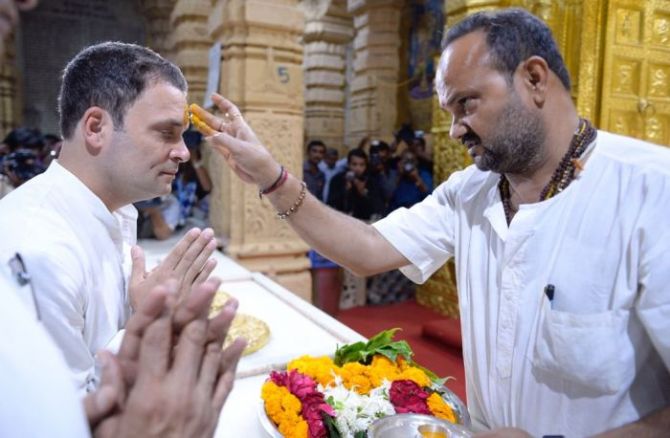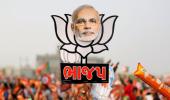The electoral bounty reaped by the Congress was nothing more than an ill-gotten gain of a casteist, divisive campaign; nothing to be proud of and certainly not a moral victory, argues Vivek Gumaste.

It was the mother of all elections, a no holds barred, high stakes, high strung contest with far reaching ramifications for both the contenders.
For the Bharatiya Janata Party it was their citadel, their impregnable bastion and the home turf of their popular PM that could exhibit no vulnerability.
For the Congress, there was a lot riding on this election; a fight for survival after a string of devastating defeats that seemed to portend the near eclipse of this legendary party; and for its heir apparent, Rahul Gandhi it was a litmus test of his leadership with his anointment as party president imminent.
The Gujarat verdict when it came was quintessential amphibology: One that was open to starkly contrasting interpretations as per one's perspective: Both sides could claim victory with a certain degree of logic.
The Congress deemed it a 'moral victory' while the BJP responded, 'Jo jeeta wohi Sikander.'
At the outset there appeared to be an element of truth in both assertions.
The BJP had won a clear majority for the sixth consecutive term overcoming insurmountable incumbency odds but with a significantly reduced margin (a drop from 115 to 99 seats).
For the Congress it was ostensibly a spectacular revival coming as it did on the heels of the humiliating debacle in UP: An increase of 16 seats, up from 61 to 77.
But do these final numbers tell the entire story?
Was there a significant dent in the BJP's popularity?
Was the increased seat tally an indicator of the Congress' resurgent acceptability or was it merely the outcome of an astute but cringe-worthy electoral strategy?
These are the questions germane to the analysis of the Gujarat verdict.
Lost in the mesmerisation of numbers and the high decibel tooting of a Congress revival was an occurrence of far greater significance: A watershed moment in political history.
The Gujarat election of 2017 signalled the political capitulation of Nehruvian secularism, the lynchpin of Congress ideology.
Nehruvian secularism was a flawed ideology that centered on the devaluation of the Hindu identity and one that had been executed with an even more faulty strategy of minority appeasement and vote bank politics: Its demise was inevitable.
The Congress' proclamation that 'Rahul Gandhi is not only a Hindu, but a "janeu-dhari" Hindu (one who wears the sacred thread)' along with his endless forays to temples all across Gujarat represents a total surrender: A carte blanche acceptance of the nihility of Nehruvian secularism and a final acknowledgement of the dominance of Hindu nationalism.
Nothing could be more ironic and telling than the sight of the great grandson of Nehru (the man who had frowned upon the restoration of the Somnath temple and opposed its inauguration in 1951 by then President Rajendra Prasad) paying obeisance at the same temple nearly 66 years later.
In 1951 Nehru had written to Dr Rajendra Prasad: 'I confess I do not like the idea of your associating yourself with a spectacular opening of the Somnath temple. This is not merely visiting a temple... but rather participating in a significant function which unfortunately has a number of implications.' (Sarvepalli Gopal, Selected Works of Jawaharlal Nehru).
The second disturbing element of the Congress campaign in Gujarat was its unabashed exploitation of caste.
The offer of reservations to Patidars was crass political opportunism sans probity or rationale, but not surprising.
The Congress is well-known for engineering caste dissensions to win elections; its nefarious history dates back to the 1980s and Madhavsinh Solanki.
Adrija Roychowdhury states in the Indian Express (external link):
'The Congress came to power in 1980 with an electoral strategy of appealing to the backward castes and classes... They contested the state elections on the basis of the KHAM (Kshatriyas, Harijans, Adivasis and Muslims) strategy. The KHAM constituted 55 per cent population and the newly-elected Congress government ensured that they were entitled to caste-based reservations...'
'As soon as Solanki established himself as chief minister, a new era of politics was ushered into the state -- the era of caste politics.'
Finally, Roychowdhury rightly concludes about the current verdict:
'While the Patidar and OBC factors were unsuccessful in shaking the BJP's stronghold on the state, the marked improvement made by the Congress in its electoral performance shows that caste did in fact have a role to play. Is Gujarat then, in the era of caste politics 2.0?'
On the other hand, the BJP ran an inclusive campaign that conformed to its slogan of 'Sabka Saath Sabka Vikas' and reached out to one and all including the Muslim community as these reports indicate:
'The BJP began this purported connect with Ahmedabad's traditional Muslim neighbourhood, even as Congress vice-president Rahul Gandhi undertook road shows across Gujarat, sipping tea at wayside stalls along with the traditional fried gram flour snack -- the ubiquitous ganthiya -- as his party strategists carefully kept any Muslim symbolism out of his tour plan.' (Indian Express: External link).
'While BJP bosses have asked local party leadership across Gujarat to reach out to Muslims, the Congress' local leaders have, on occasions, tried to keep the community at an arm’s length.' (Business Standard: External link).
Finally, coming to the actual vote share: The Congress did register a 2.5% increase compared to 2012 (41.4 per cent vs 38.93 per cent). This increase would have been more significant had it come at the expense of the BJP but this was not so.
In fact, the BJP increased its vote share from 47.85% to 49.1%, suggesting that its overall popularity was firmly intact barring a few areas of weakness.
In conclusion, the electoral bounty reaped by the Congress was nothing more than an ill-gotten gain of a casteist, divisive campaign; nothing to be proud of and certainly not a moral victory.
In reality, it was an unequivocal moral triumph for the BJP that saw its philosophy vindicated beyond doubt.
Vivek Gumaste is a US-based academic, political commentator and the author of My India: Musings of a Patriot.











 © 2025
© 2025